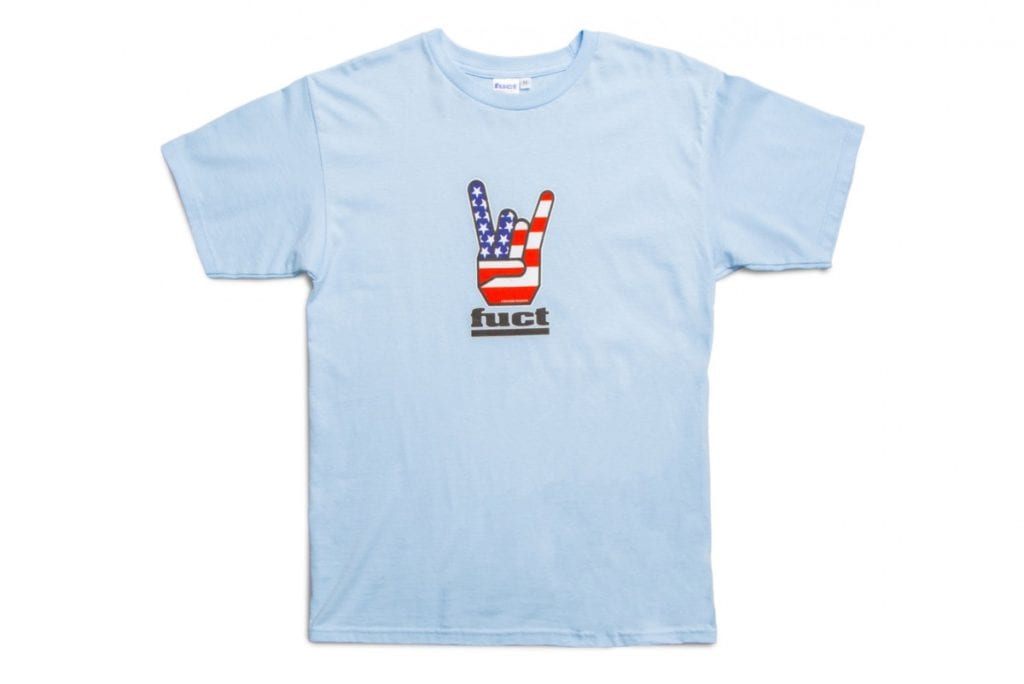Fuct – the streetwear brand whose name sounds a whole lot like the “f” word – has been handed a win from the nation’s highest court. On Monday, after hearing the case that has pitted Erik Brunetti’s well-known brand against the government, the Supreme Court issued an opinion, which holds that the longstanding “prohibition on registration of ‘immoral or scandalous’ trademarks violates the First Amendment,” thereby, paving the way for “Fuct” and other marks to potentially be registered with the U.S. Patent and Trademark Office.
According to the 6-3 opinion written by Justice Elena Kagan, with dissents from Chief Justice John Roberts and Justices Stephen Breyer and Sonia Sotomayor, the 114-year old bar against “immoral or scandalous” that is present in the Lanham Act – the federal law that governs trademarks in the U.S. – “discriminates on the basis of viewpoint and so collides with this Court’s First Amendment doctrine.”
The Supreme Court’s 9-justice panel agreed in January to review the case, which got its start in 2011 when Brunetti sought and was denied a registration for the name of his nearly 30 year old Los Angeles-based streetwear brand by the U.S. Patent and Trademark Office (“USPTO”). In refusing Brunetti a registration and the bundle of benefits that come with it, the USPTO pointed to the Lanham Act’s bar against the registration of names, logos and other marks that are deemed “immoral” or “scandalous.” Fuct fit squarely within this territory, according to the U.S. trademark body.
Brunetti disagreed, arguing that the “immoral” and “scandalous” trademark ban is an unconstitutional restriction on free speech, and in December 2017, the U.S. Court of Appeals for the Federal Circuit took his side, stating that that while “fuct” is, in fact, “scandalous,” the First Amendment “protects private expression, even private expression that is offensive to a substantial composite of the general public,” and such protection extends to the “fuct” mark.
The celebrated streetwear designer walked away with a win, but his victory was cut short when the USPTO formally requested that the Supreme Court take on the case, and consider whether the Lanham Act’s prohibition is facially invalid (i.e., unconstitutional) under the Free Speech Clause of the First Amendment.
According to the USPTO’s petition, which was filed on behalf of Andrei Iancu, the Under Secretary of Commerce for Intellectual Property and the Director of the USPTO, the Federal Circuit erred in siding with Brunetti. In the 73-page filing, the USPTO argued that the Lanham Act’s ban on the registration of scandalous marks does not run afoul of the First Amendment because it does not restrict what may be used as trademarks, only what may be registered. In other words, the USPTO may refuse to register a mark but even then, it does not prevent the trademark application filing party’s use of that mark.
In oral arguments before the Supreme Court in April, Brunetti’s counsel argued that in determining what marks are subject to registration, the USPTO decides what is offensive to the general public, and in the process, necessarily prefers some viewpoints over others. That is significant, as such “viewpoint discrimination” is not a valid basis for the denial of a trademark application, and thus, runs afoul of the free speech clause of the First Amendment.
Counsel for the government argued that banning vulgar terms does not amount to viewpoint discrimination, and thus, the government should not be forced to promote trademarks that would be shocking or profane to the public by way of the federal trademark system.
SCOTUS, unpersuaded by the government’s argument, sided with Brunetti. In the majority’s decision, Justice Kagan pointed to the fact that the Lanham Act’s bar “on its face, distinguishes between two opposed sets of ideas: those aligned with conventional moral standards and those hostile to them; those inducing societal nods of approval and those provoking offense and condemnation.”
“This facial viewpoint bias in the law,” Kagan writes, “results in viewpoint-discriminatory application. The [USPTO] has refused to register marks communicating ‘immoral’ or ‘scandalous’ views about (among other things) drug use, religion, and terrorism. But all the while, it has approved registration of marks expressing more accepted views on the same topics.”
Now, the matter will be referred back to the USPTO, where a number of Brunetti’s trademark applications for registrations are currently on hold pending the outcome of the litigation.
While Brunetti potentially already maintains common law (i.e., state law) rights in his brand’s name as a result of his use of the name in commerce (although at least one lower court has held that a mark specifically excluded from federal registration on policy grounds may not take advantage of §43(a) either), a federal registration grants him “a number of significant advantages over common law rights alone,” per the USPTO, including but not limited to the ability to record the U.S. registration with U.S. Customs and Border Protection to prevent importation of infringing foreign goods and the ability to use the U.S. registration as a basis to obtain registration in foreign countries.
*The case is ANDREI IANCU v. ERIK BRUNETTI, 18-302 (SCOTUS).














